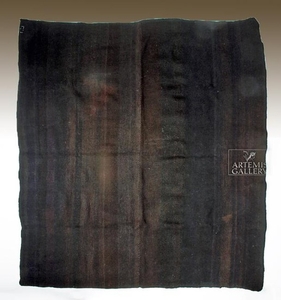Large 20th C. Bolivian Aymara Awayu Textile Weaving
100% of the Hammer price of all lots sold in this auction will be donated to the Walk to End Alzheimer's Disease, the world's largest event to raise awareness and funds for Alzheimer's care, support and research.
**Originally Listed At $200**
New World, South America, Bolivia, Aymara (Aimara) people, ca. early 20th century CE. An Aymara Awayu weaving (Quechua Phullu) woven from alpaca wool of a solid black color scheme. Awayu (hispanicized term from aguayo) were woven blankets used to carry belongings on the back. The Aymara are an indigenous group who live in Bolivia, Peru, and Chile, in the Altiplano, mostly in the high altitude valley around Lake Titicaca. They are famous for their many different styles and types of woven textiles. Size: 44" L x 41.25" W (111.8 cm x 104.8 cm)
After the arrival of the Spanish, Aymara woven textiles became a way for indigenous people to mark their identity - first, as a symbol of status for Mestizos who could not afford European textiles, and then as a way of showing rebellion to the Spanish after other forms of clothing were outlawed following native uprisings. Today they continue to make these beautiful textiles, which have gained worldwide acclaim.
Provenance: ex-Historia Antiques, James Caswell collection, Santa Monica, California, USA
All items legal to buy/sell under U.S. Statute covering cultural patrimony Code 2600, CHAPTER 14, and are guaranteed to be as described or your money back.
A Certificate of Authenticity will accompany all winning bids.
We ship worldwide to most countries and handle all shipping in-house for your convenience.
#125187
Condition Report: The textile is comprised of two large panels that were handsewn together. There is an old inventory label sewn to a corner of one side. Minor areas of slight fading and nubby/looser weave. Slight fraying to areas of the periphery.
View it on
Sale price
Estimate
Time, Location
Auction House
100% of the Hammer price of all lots sold in this auction will be donated to the Walk to End Alzheimer's Disease, the world's largest event to raise awareness and funds for Alzheimer's care, support and research.
**Originally Listed At $200**
New World, South America, Bolivia, Aymara (Aimara) people, ca. early 20th century CE. An Aymara Awayu weaving (Quechua Phullu) woven from alpaca wool of a solid black color scheme. Awayu (hispanicized term from aguayo) were woven blankets used to carry belongings on the back. The Aymara are an indigenous group who live in Bolivia, Peru, and Chile, in the Altiplano, mostly in the high altitude valley around Lake Titicaca. They are famous for their many different styles and types of woven textiles. Size: 44" L x 41.25" W (111.8 cm x 104.8 cm)
After the arrival of the Spanish, Aymara woven textiles became a way for indigenous people to mark their identity - first, as a symbol of status for Mestizos who could not afford European textiles, and then as a way of showing rebellion to the Spanish after other forms of clothing were outlawed following native uprisings. Today they continue to make these beautiful textiles, which have gained worldwide acclaim.
Provenance: ex-Historia Antiques, James Caswell collection, Santa Monica, California, USA
All items legal to buy/sell under U.S. Statute covering cultural patrimony Code 2600, CHAPTER 14, and are guaranteed to be as described or your money back.
A Certificate of Authenticity will accompany all winning bids.
We ship worldwide to most countries and handle all shipping in-house for your convenience.
#125187
Condition Report: The textile is comprised of two large panels that were handsewn together. There is an old inventory label sewn to a corner of one side. Minor areas of slight fading and nubby/looser weave. Slight fraying to areas of the periphery.



